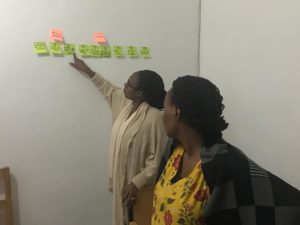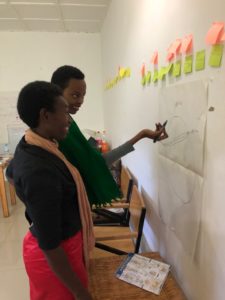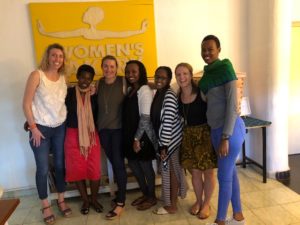Posner Center tenant, The Women’s Bakery, is a social enterprise with three wholly owned and operated bakeries in Rwanda, a franchise pilot in Uganda, and three other trained, but independently-owned, bakeries in East Africa.
Their modus operandi is about as old as human civilization itself. Historically, the domestication of wheat and the advent of agriculture was a major component in the development of settlements, and by extension, the forward progress of civilization. Thus, bread has been — and still is — one of the most important staples of society, because of its relative ease in preparation, its versatility, and its nutritional value. In a country like Rwanda, where 40% of children are chronically malnourished, the importance of The Women’s Bakery’s work to supply a long-term, affordable source of nutrition cannot be overstated.
Yet, it’s not just about the bread. In Rwanda, 57% of women don’t have an option of going to school, and the majority of adult women are not paid for their work, which goes hand-in-hand with a lack of access to nutrition, shelter, and health care. The Women’s Bakery recruits and trains local women to become bakers and managers, giving them access to gainful employment and transferable skills. Their model empowers women to launch and manage bakeries, and ensures long-term success providing for themselves and their communities, equipping them with the skills necessary to be successful in the future. This unique combination of enterprise and food security is quite a recipe for success.
Madeleine Binsfrahm, Director of Development for The Women’s Bakery, was kind enough to sit down with us and tell us about their recent work, successes, and challenges.
Jamie Hansen: Hi Madeleine! Tell me a little about your recent trip to Rwanda.
Madeleine Binsfrahm: So, recently two of our team members from the U.S. office — Markey Culver, the CEO and founder of The Women’s Bakery, and myself — traveled over to Rwanda to visit the bakeries, which we do several times a year. One of the exciting programs I initiated in Rwanda was offering a process improvement training for our management team.
What I think is so exciting about process improvement is that it applies across the board. So, whether you’re improving a financial process, or you’re improving how you order flour for bakeries, the same principles apply. It was really exciting to have our team members looking at process improvement from so many different angles. You know, we broke into teams and we had two of our team members working on how to process improve meetings, right? So, if you’ve got people in different locations, how do you improve to make sure that you’re being the most effective with those calls, mapping that out, and coming up with some solutions about how to improve that? And then we had other people working on ‘how do you order flour more effectively?’ and process improve that so you’re getting a bulk discount, streamlining orders and taking less time.
JH: So, there are three bakeries in Rwanda. Do they work independently from each other, or do they all communicate and work together?
MB: Yeah, they all work with each other. So, we’re a social enterprise and a charitable 501(c)(3) organization in the U.S., and we own the bakeries. They’re wholly owned by the charitable organization. All three bakeries are working to become profitable, but right now, they continue to be supported by the charitable organization. So, for example, we have a Program Manager who oversees two of the bakeries, we have a Director of Operations who oversees all three of the bakeries, and a Social Impact Coordinator who works on social impact across the bakeries.
JH: So, what’s the overall vision of The Women’s Bakery?
MB: So, it’s two parts. One part is empowering women through employment. Our model involves recruiting local Rwandan women, who have maybe not had access to education or formal employment. First, we train them to become bakers. Upon graduation, they receive an accredited and transferable certificate, which is significant because some of these women cannot even read or write. Then with that certificate, they can apply for employment. That employment allows them to earn income, a steady, stable income. They’re able to provide their children more than one meal a day, so now their families are eating two to three nutritious meals. They’re able to have the option of sending their children to school, and they’re able to move into safer homes. That income empowers them to make decisions for their own selves and their own lives.

The second piece is that all of the bread that those women are baking is nutritious. It tends to be high in protein, and it’s always nutritious.
We intentionally keep the sugar and fat content lower, and we intentionally increase things like protein so we’re naturally fortifying our bread products with milk and eggs. Our most popular piece of bread is called the ‘tresse,’ also known as the honey twist. It contains about 40% of a small child’s protein. The best part about it is that it only costs about 100 Rwandan francs, which is about 11 U.S. cents. So, for a single coin, you can get a piece of bread that will help you feel full. When you consider that a lot of children are only eating one meal a day, it’s a huge difference when all of a sudden you’re introducing a protein-packed snack, particularly to a small child.
JH: What have been some success stories that you’ve seen?
MB: I think one of the biggest successes is watching women start at the bakery at an entry level and work their way up. For example, one of our bakery operation managers began as a baker. She showed leadership skills and really stepped up and said: “I want to take on more responsibility.” So, we promoted her to Bakery Operations Manager, and now she runs a team of six women, and she knows everything that they’ve been through and how to connect with them at a deeper level.
JH: What are some challenges you’ve run into doing this?
MB: One of the big challenges we had initially is that we thought we could deliver all the bread on foot, right? So, women make bread, they go out, and they sell it to local markets. Then we thought, we can only reach so far on foot, so we’ll do bicycles, right? So, we hired bicycle delivery men because it’s taboo for women to ride a bicycle. Well, that’s great when it’s the dry season, but when it’s the rainy season, that doesn’t work so well anymore. Bread production just kind of shuts down because you can’t get to the market. So, we’ve invested in delivery trucks. They’re called hard bodies. It’s like a motorcycle in front, and a little mini truck in the back. They’re covered so we can actually deliver in the rain.

Sometimes it feels like things are insurmountable, like weather. Yeah, we can’t change the weather, so then let’s change our delivery method. Figure out how to invest in ways to overcome those challenges. One of the things we found is that it was really challenging for a lot of the women to work in a formal workplace. This is their first time in formal employment. What does that look like? What does that mean? One of the things that we’ve done is put in a couple of layers of management. So, we’ve got Bakery Operations Managers, and then we have Program Managers above them who are able to be a little more strategic, whereas our Bakery Operations Managers can be more hands on.
Another thing we have through our social impact program is the investment in mental health counseling. Every single month, there’s a mental health counselor that comes to each bakery and offers one-on-one sessions, and then also a group session over lunch. So, it’s a way to help engage the women in helping them to think through life’s challenges.
JH: Do you find that their view opens up once they’ve been there for a little while, as far as opportunities that are available to them?
MB: Absolutely. I think that what we see is women dream bigger and bigger, and they start to see more possibility for themselves, for their bakeries, and their families. That’s actually one of the things we do every year is we do goal setting. So, what is it that you want to accomplish this year? Okay, so you want to move into a two-bedroom house because you have five children. So, how do we help you, you know, with budgeting or financial education? So, we’re able to put into place programming to help the women achieve their personal goals.
JH: Last but not least, what’s your favorite variety of bread?
MB: Oh, my favorite is at the Gicumbi bakery. They make a whole-wheat bread, and it’s just phenomenal. It’s excellent. I think that they’re getting a different whole-wheat flour up in Gicumbi. It’s our suburban bakery and it’s in the northern part of Rwanda, so it’s a little bit cooler.
Learn more about The Women’s Bakery here.

